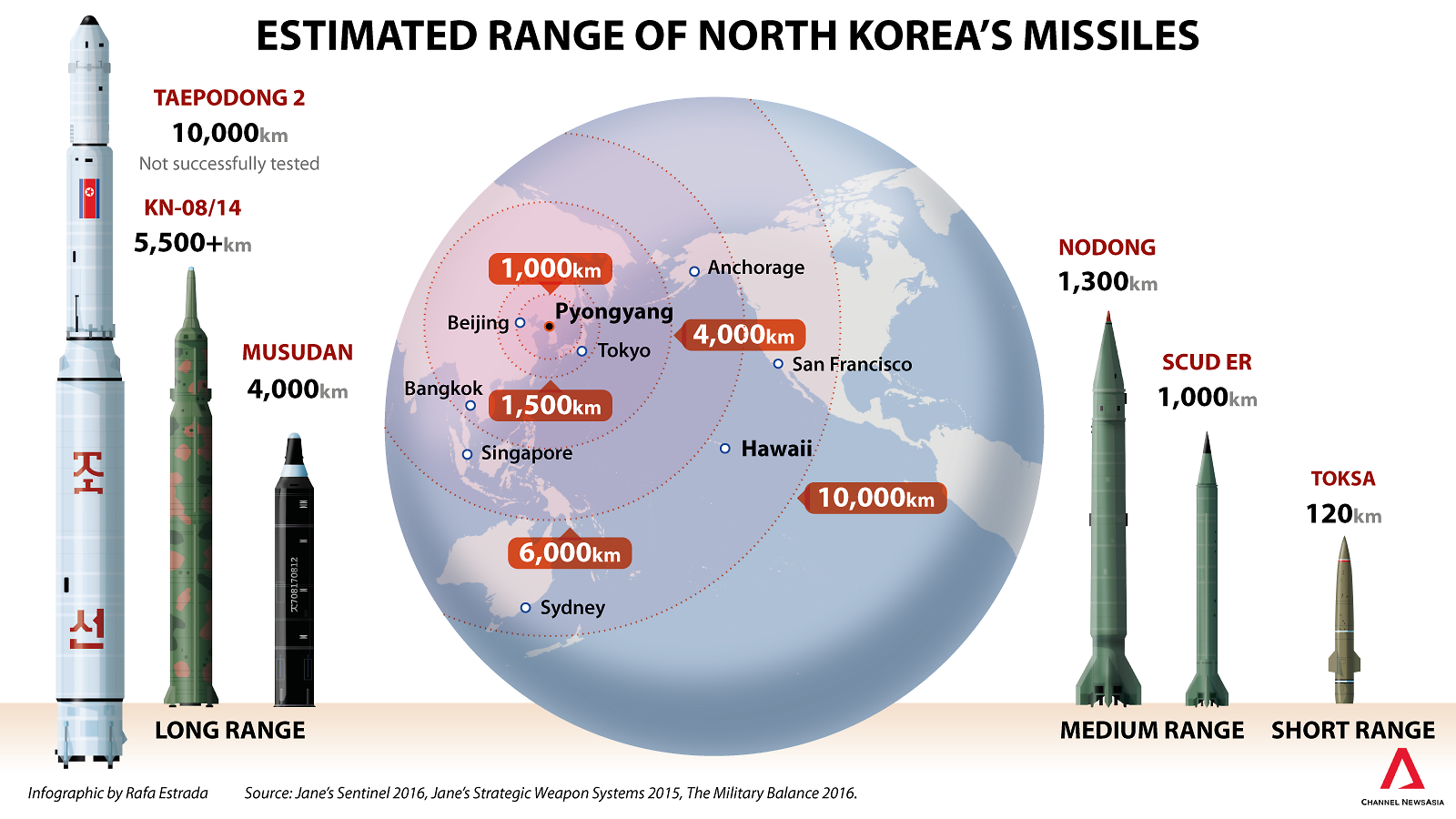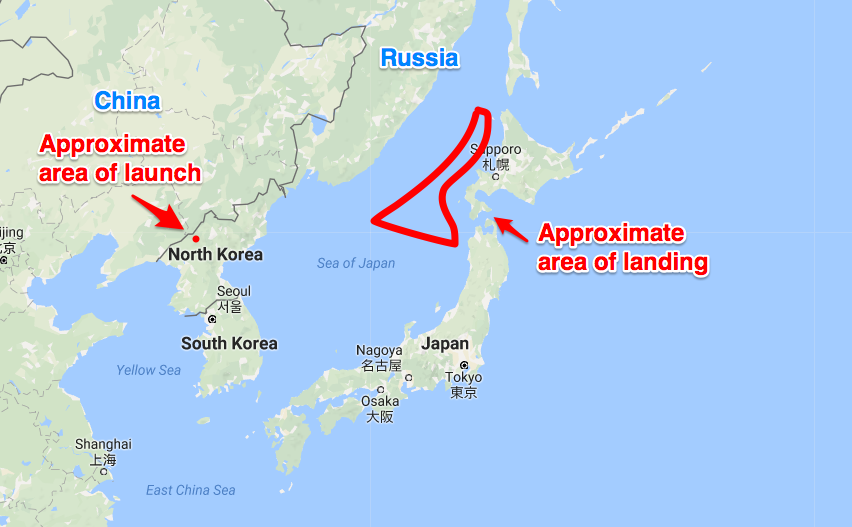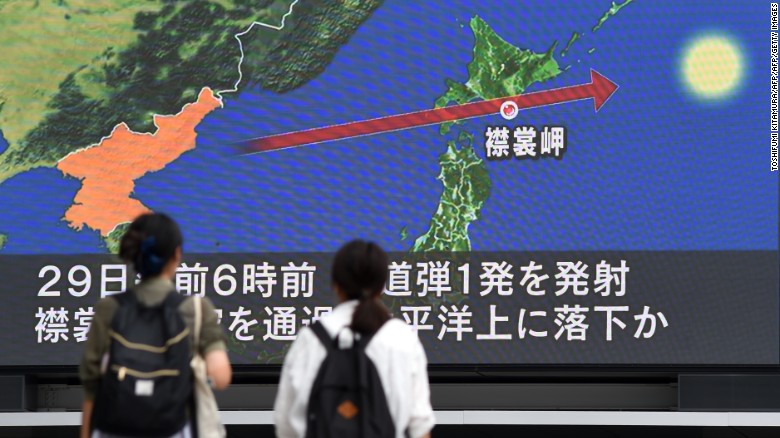The tensions continue to rise in the Korean Peninsula, after North Korea fired a missile over Japan for the second time in two weeks. This move comes after the UN imposed further sanctions last week over the Pyongyang regime – sanctions that were approved unanimously by all countries and that revolve around the country’s textile exports and a ceiling on the country’s imports of crude oil.
The US ambassador to the UN, Nikki Haley, and the national security advisor, HR McMaster, reported that this latest set of UN sanctions would be the last ones imposed over the North Koreans, suggesting that if the nuclear tests don’t end after this, the US would consider a military action as soon as possible.
“
What is different about this approach is: we’re out of time, right? We have been kicking the can down the road and we’re out of road. For those who have been commenting about the lack of a military option – there is a military option. Now, it’s not what we prefer to do, so what we have to do is call on all nations to do everything we can to address this global problem, short of war” McMaster said on Friday.
Total war
This prospect, albeit the final solution in case North Korea continues with its plans to further develop nuclear capabilities, is more than grim. The aftermath of such a military action would leave behind total devastation and a huge number of civilian casualties. Even the most limited strike risks everything, mainly because North Korean could retaliate with the thousands of artillery pieces it has positioned along its border with the South. In case of an all-out war, the capital city of Seoul would get bombarded several times before the NATO forces could retaliate, given the close proximity of the city to the boarder.
The last time the United States is known to have seriously considered a pre-emptive strike on the North was back in 1994 – when the North Koreans had not progressed that much in their nuclear research and other various military capabilities. The plan was scrapped altogether, after the Pentagon conducted that a warfare with Pyongyang would leave hundreds of thousands dead. Fast-forward a couple of decades, and we can all see what the major issue is at play here – a scenario where 8.000 artillery cannons and rocket launchers could potentially launch 300.000 rounds on the South in the first hour of a counterattack is one to be truly afraid of.

To further imagine the damage a war would cause, let’s talk about civilian casualties: most studies project that 60.000 fatalities would occur in the first full day of a surprise artillery attack on military targets. In case of civilian targeting, the number would rise up to 300.000 dead in the first day of combat. The Seoul metropolitan government says there are nearly 3.300 bomb shelters in the city, enough to accommodate all 10 million of its residents. Problem is – few people keep stockpiles of food and water, and while the government has thought about buying more than 1.8 million gas masks for use in case of a chemical attack, that number would not be nearly enough to protect the entire population of the city. In case something bad happens, in the midst of panic and despair, everybody will act on their own accord, as best as they can.
The missile
Flight data collected by various security agencies across the world show that the North Korean missile travelled higher and further than the one fired on the 29
th of August, suggesting that the regime is continuing to make advances in its missile and nuclear weapons programmes – which roughly translates into the fact that the sanctions imposed up until now had no effect whatsoever on Pyongyang, which comes to no surprise, seeing that China still supplies North Korea with most of its oil and Russia still being the largest employer of North Korean forced labour.
Japan has already warned North Korea it risked having no “
bright future” and called for an emergency meeting of the UN Security Council. Shinzo Abe, the Japanese PM, called the launch “
absolutely unacceptable” and further added that “
Now is the time when the international community is required to unite against North Korea’s provocative acts, which threaten world peace”. The Japanese are rightfully worried about the whole situation – the ballistic missile flew over Japanese territory for the second time in just a couple of weeks, triggering emergency sirens and text alerts minutes before it passed over the northern Japanese island of Hokkaido, prompting millions of people to receive alert warnings asking them to seek cover immediately.

The multiple missile tests in recent months have sparked concert in Japan and ushered in a national debate over civil defence not witnessed since the end of the war. About a dozen towns have conducted pre-emptive evacuation drills and sales of nuclear shelters have soared across Japan. North Korea’s proximity means that Japanese authorities realistically have less than 10 minutes to confirm a missile launch and issue the alerts for evacuation – a task that takes its toll over the general population.
No turning back
In the meanwhile, the North Korean leader Kim Jong-un has vowed to reach the country’s nuclear goals, according to the state media. “
The aim of North Korea is to establish an equilibrium of military force with the US”, the KCNA news agency quoted him as saying. “
We should clearly show the big power chauvinists how our state attains the goal of completing its nuclear force despite their limitless sanctions and blockade”. Kim Jong-un personally watched the launch of the Hwasong-14 ballistic missile on Friday and seemed to be ecstatic that the missile reached an altitude of 770 km, traveling 3.700 km past the northernmost island of Hokkaido – which would make it the furthest any North Korean ballistic missile has ever traveled above ground.
The following weeks will prove crucial to every single party involved. The upcoming U.N. Security Council will most likely touch this sensitive subject a lot – but we have yet to see any results coming in from imposing sanctions over the Pyongyang regime. In just two years, under severe sanctions imposed by most of the world’s countries, North Korea has managed to turn a floundering medium-range missile project into a successfully launched ICBM. This continuous back-and-forward game is clearly not working – but a military option should remain the last one everybody should think about, considering the proximity of North Korea’s army to Seoul and the prospects of an all-out war between Pyongyang and NATO.
All we have to do is to sit and wait – and hope that the people in charge will try to defuse this whole situation as peaceful as possible. War should be avoided at all costs, by all the parties involved.
 To further imagine the damage a war would cause, let’s talk about civilian casualties: most studies project that 60.000 fatalities would occur in the first full day of a surprise artillery attack on military targets. In case of civilian targeting, the number would rise up to 300.000 dead in the first day of combat. The Seoul metropolitan government says there are nearly 3.300 bomb shelters in the city, enough to accommodate all 10 million of its residents. Problem is – few people keep stockpiles of food and water, and while the government has thought about buying more than 1.8 million gas masks for use in case of a chemical attack, that number would not be nearly enough to protect the entire population of the city. In case something bad happens, in the midst of panic and despair, everybody will act on their own accord, as best as they can.
The missile
Flight data collected by various security agencies across the world show that the North Korean missile travelled higher and further than the one fired on the 29th of August, suggesting that the regime is continuing to make advances in its missile and nuclear weapons programmes – which roughly translates into the fact that the sanctions imposed up until now had no effect whatsoever on Pyongyang, which comes to no surprise, seeing that China still supplies North Korea with most of its oil and Russia still being the largest employer of North Korean forced labour.
Japan has already warned North Korea it risked having no “bright future” and called for an emergency meeting of the UN Security Council. Shinzo Abe, the Japanese PM, called the launch “absolutely unacceptable” and further added that “Now is the time when the international community is required to unite against North Korea’s provocative acts, which threaten world peace”. The Japanese are rightfully worried about the whole situation – the ballistic missile flew over Japanese territory for the second time in just a couple of weeks, triggering emergency sirens and text alerts minutes before it passed over the northern Japanese island of Hokkaido, prompting millions of people to receive alert warnings asking them to seek cover immediately.
To further imagine the damage a war would cause, let’s talk about civilian casualties: most studies project that 60.000 fatalities would occur in the first full day of a surprise artillery attack on military targets. In case of civilian targeting, the number would rise up to 300.000 dead in the first day of combat. The Seoul metropolitan government says there are nearly 3.300 bomb shelters in the city, enough to accommodate all 10 million of its residents. Problem is – few people keep stockpiles of food and water, and while the government has thought about buying more than 1.8 million gas masks for use in case of a chemical attack, that number would not be nearly enough to protect the entire population of the city. In case something bad happens, in the midst of panic and despair, everybody will act on their own accord, as best as they can.
The missile
Flight data collected by various security agencies across the world show that the North Korean missile travelled higher and further than the one fired on the 29th of August, suggesting that the regime is continuing to make advances in its missile and nuclear weapons programmes – which roughly translates into the fact that the sanctions imposed up until now had no effect whatsoever on Pyongyang, which comes to no surprise, seeing that China still supplies North Korea with most of its oil and Russia still being the largest employer of North Korean forced labour.
Japan has already warned North Korea it risked having no “bright future” and called for an emergency meeting of the UN Security Council. Shinzo Abe, the Japanese PM, called the launch “absolutely unacceptable” and further added that “Now is the time when the international community is required to unite against North Korea’s provocative acts, which threaten world peace”. The Japanese are rightfully worried about the whole situation – the ballistic missile flew over Japanese territory for the second time in just a couple of weeks, triggering emergency sirens and text alerts minutes before it passed over the northern Japanese island of Hokkaido, prompting millions of people to receive alert warnings asking them to seek cover immediately.
 The multiple missile tests in recent months have sparked concert in Japan and ushered in a national debate over civil defence not witnessed since the end of the war. About a dozen towns have conducted pre-emptive evacuation drills and sales of nuclear shelters have soared across Japan. North Korea’s proximity means that Japanese authorities realistically have less than 10 minutes to confirm a missile launch and issue the alerts for evacuation – a task that takes its toll over the general population.
No turning back
In the meanwhile, the North Korean leader Kim Jong-un has vowed to reach the country’s nuclear goals, according to the state media. “The aim of North Korea is to establish an equilibrium of military force with the US”, the KCNA news agency quoted him as saying. “We should clearly show the big power chauvinists how our state attains the goal of completing its nuclear force despite their limitless sanctions and blockade”. Kim Jong-un personally watched the launch of the Hwasong-14 ballistic missile on Friday and seemed to be ecstatic that the missile reached an altitude of 770 km, traveling 3.700 km past the northernmost island of Hokkaido – which would make it the furthest any North Korean ballistic missile has ever traveled above ground.
The following weeks will prove crucial to every single party involved. The upcoming U.N. Security Council will most likely touch this sensitive subject a lot – but we have yet to see any results coming in from imposing sanctions over the Pyongyang regime. In just two years, under severe sanctions imposed by most of the world’s countries, North Korea has managed to turn a floundering medium-range missile project into a successfully launched ICBM. This continuous back-and-forward game is clearly not working – but a military option should remain the last one everybody should think about, considering the proximity of North Korea’s army to Seoul and the prospects of an all-out war between Pyongyang and NATO.
All we have to do is to sit and wait – and hope that the people in charge will try to defuse this whole situation as peaceful as possible. War should be avoided at all costs, by all the parties involved.
The multiple missile tests in recent months have sparked concert in Japan and ushered in a national debate over civil defence not witnessed since the end of the war. About a dozen towns have conducted pre-emptive evacuation drills and sales of nuclear shelters have soared across Japan. North Korea’s proximity means that Japanese authorities realistically have less than 10 minutes to confirm a missile launch and issue the alerts for evacuation – a task that takes its toll over the general population.
No turning back
In the meanwhile, the North Korean leader Kim Jong-un has vowed to reach the country’s nuclear goals, according to the state media. “The aim of North Korea is to establish an equilibrium of military force with the US”, the KCNA news agency quoted him as saying. “We should clearly show the big power chauvinists how our state attains the goal of completing its nuclear force despite their limitless sanctions and blockade”. Kim Jong-un personally watched the launch of the Hwasong-14 ballistic missile on Friday and seemed to be ecstatic that the missile reached an altitude of 770 km, traveling 3.700 km past the northernmost island of Hokkaido – which would make it the furthest any North Korean ballistic missile has ever traveled above ground.
The following weeks will prove crucial to every single party involved. The upcoming U.N. Security Council will most likely touch this sensitive subject a lot – but we have yet to see any results coming in from imposing sanctions over the Pyongyang regime. In just two years, under severe sanctions imposed by most of the world’s countries, North Korea has managed to turn a floundering medium-range missile project into a successfully launched ICBM. This continuous back-and-forward game is clearly not working – but a military option should remain the last one everybody should think about, considering the proximity of North Korea’s army to Seoul and the prospects of an all-out war between Pyongyang and NATO.
All we have to do is to sit and wait – and hope that the people in charge will try to defuse this whole situation as peaceful as possible. War should be avoided at all costs, by all the parties involved.









